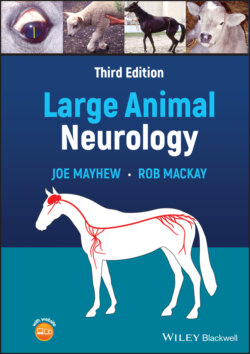Читать книгу Large Animal Neurology - Joe Mayhew - Страница 94
Prion agents
ОглавлениеThe transmissible spongiform encephalopathies or prion diseases are caused by novel infectious agents that do not incite a detectable immune response in the host. Generally, they are endemic diseases of low incidence, have a prolonged incubation period, and are uniformly fatal. Although evidence of the infectious agent can usually be detected in several peripheral tissues, particularly those of the lymphoreticular system, pathological lesions are confined to the nervous system. The lesions consist of vacuolation of neurons, neuronal loss, astrocytosis and microglial activation, and accumulation of protease‐resistant, self‐propagating forms of the host‐encoded protein PrP, termed PrPSc. In some cases, accumulations of PrPSc as amyloid plaques and scrapie‐associated fibrils occur in the brain.
Injury causing only loss of function is referred to as concussion in the brain, spinal shock in the spinal cord and neurapraxis in the PNS.
